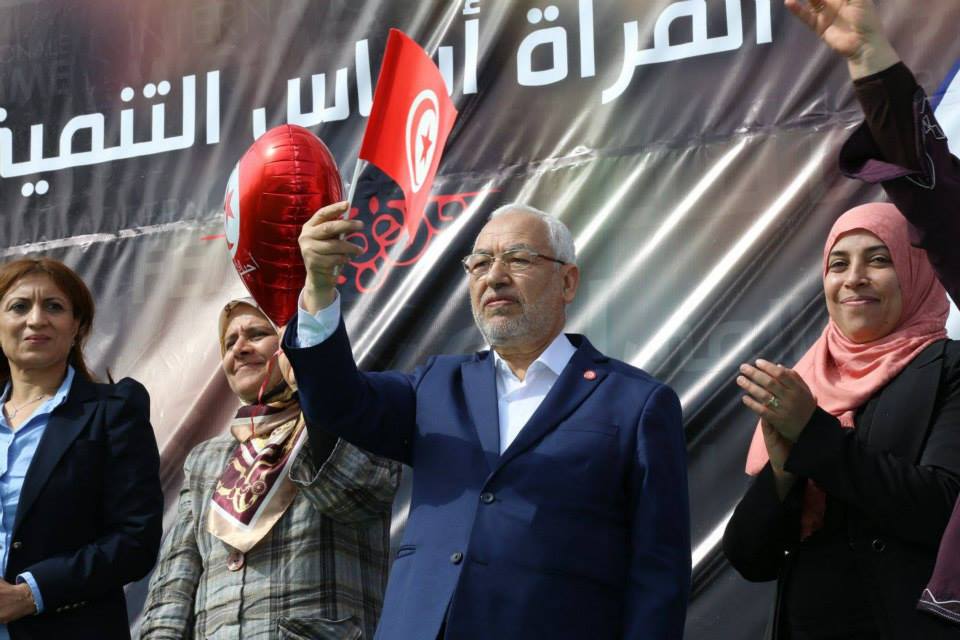Tunisia heads toward another crisis

Rached Ghannoushi.
By Monia Mazigh
September/October 2022
In 1857, under foreign pressure from some Western countries to open up international trade, implement greater religious tolerance and establish equal treatment (mainly for foreigners) before the law, Mohamed II Bey (d. 1423), monarch of Tunisia, announced the Ahd al-Aman (the Fundamental Pact). This document paved the road to a reform movement that had already found its way to Istanbul, and was the Arab region’s first constitution and the first constitution written in a Muslim country.
Indeed in 1861, after the Bey appointed a commission to study the topic, the first Tunisian constitution came into effect under Mohamed III Bey, the Bey’s successor. This was the beginning of a new era: constitutional monarchy. But despite its strong symbolism, this constitution weakened the Bey’s rule in favor of the European migrants who were given property rights and equal treatment with the locals. A few years later, French colonization officially started.
It took Tunisia almost a century and a sad and miserable passage under French colonialism to finally write its second constitution. The major difference this time was that the country had gained its independence, ditched the monarchy and proclaimed itself a republic. In 1959, the new constitution was adopted, inspired by the French one but still with a clear reference to Islam and Arabic, respectively, as religion and official language.
Once again, the political symbolism and independence euphoria made many Tunisians forget or ignore the dangers and threats that this same document contained the seeds of autocracy. Indeed, it consolidated Habib Bourguiba’s (d. 2000) reign, the nationalist leader who had led the county to independence. The presidential regime he implemented and the later constitutional amendments he conducted kept the senile autocrat in power until a soft coup by Zine El Abidine Ben Ali, his former prime minister, placed him under house arrest in 1987 and announced a “new” era.
After the Arab Spring (Dec. 2010) and the ousting of President Ben Ali, Tunisians wanted no more autocratic regimes and one-man rule. In 2014, a new constitution was adopted. Islam was still declared the country’s religion, and the freedom of conscience and belief was formally included, as well as gender equality. To avoid the rise of another autocrat, the new constitution placed most powers in the hands of Parliament and the prime minister. Despite its multiple merits, however, the result was an unstable Parliament with no clear majority; tension among the president, the parliamentarians and the prime minister; and a population left on its own with no economic reforms and improvements.
Unfortunately, on July 25, 2021, President Kais Saied, elected in 2019, used one of that same constitution’s articles to suspend and grab control of Parliament and its members, as well as to push the prime minister to resign. He then decided to rule by decree, making the 2014 constitution appear useless and accused it of being the mother of all the country’s problems.
In May 2022, Saied appointed Sadok Belaid a former constitutional law professor and professor emeritus at the University of Tunis, head of a commission to work on a new constitution.
While the country was struggling with the Covid-19 pandemic, skyrocketing food prices, the continual worsening of unemployment and deteriorating public finances, this constitutional project created division in the political class and a sense of confusion and restlessness among the population. With both major political parties vehemently opposing it, as well as the powerful Union Générale des Travailleurs Tunisiens with its 1 million members, very few voices were supporting it.
After Belaid presented the draft constitution to the president, he was very surprised and annoyed to notice that the draft released by the president, published in the official gazette on June 30 and to be voted on in a referendum next July 25, differed from the one his commission had delivered. According to a July 3 article on www.aljazeera.com, Belaid bluntly declared “the new constitution paved the way for a disgraceful dictatorship.”
After the enthusiasm and optimism brought by the 2014 constitution, it looks like Tunisia is moving backward. The checks and balances on the executive branch are gone, and Saied is in charge of almost everything. Parliament can no longer impeach the president. Moreover, the president monopolizes the legislative agenda, sends it for approval to Parliament and a new legislative body called the National Council of Regions and Districts and also appoints the prime minister.
Even the article Saied loosely interpreted to justify his power grab was reinforced, for he is allowed to hold all the exceptional powers he would have taken without challenge from either Parliament or the constitutional court (one of the highest instances of accountability in the previous constitution).
Since his power grab, Saied has worked hard to “dismantle” all the democratic institutions and independent bodies that were gradually implemented during the last decade, from the shutting of Parliament to dissolving the Supreme Judicial Council, to shutting down the national institute of anti-corruption and the house arrest of its executive director. All these institutions were either brutally dismantled or smeared in social media and forums.
In the last months leading to this draft, the judiciary system saw its powers and independence limited by the president’s interference. In one of his angry and virulent public outbursts, Saied sacked 57 judges, accusing them of corruption, misconduct and even adultery. He suspended them without the possibility of fair process.
Before his power grab, these institutions weren’t perfect. Struggling in a tough political and socioeconomic environment, they made mistakes and couldn’t always justify their work to a society that no longer trusted politicians and was disgusted by the ongoing corruption. However, to dissolve them, mock their work and suspend them could result in terrible consequences for the county’s political future.
Whereas both the 1959 and 2014 constitutions contained clear statements on Islam as the state religion, the new draft replaced it with an obscure and vague relationship to the ummah. Moreover, to the disapproval of some secularist supporters, the president included a statement about adopting “maqasid Islamic rulings” in his draft constitution. “Tunisia is part of the Islamic nation, and the state alone must work to achieve the goals of Islam in preserving the soul, honour, money, religion and freedom.”
Erin Clare Brown wrote on July 1, 2022 (www.thenationalnews.com) that this reference created an uproar among those who are “using” Saied to score points and settle their ideological battles with the Islamists of the Ennahda party. So even for his backers, this last move made the president’s intentions very threatening: to decide on his own on what to include and what to remove from the constitution.
But beyond these ongoing ideological fights, this new draft brings back the specter of autocracy. The arbitrary detention of political opponents, the dismissal of some governors and the partisan appointment of others, the harassment of some journalists and their arbitrary detention — many Tunisian democrats thought these were things of the past when they voted for the 2014 constitution.
Today, many signs indicate that Saied, despite his fervent denials, is taking the country down a dark path. The weak political parties, including Ennahda, who once had the highest number parliamentary of seats and their later fall in popularity, has given Saied’s dangerous populist rhetoric more leverage.
Worse, to become popular among some staunch Ennahda opponents and distract the public from his amateurish governing, Saied froze bank accounts of Ennahda’s long-time leader, Rached Ghannoushi, and eight other party leaders. On July 6, www.jazeera.com reported that he has been summoned to appear next July 19 before an investigative judge over money laundering allegations. Some rumours are even evoking the likely prospect of his arrest.
It’s no secret that “bread” usually that brings people out to demonstrate against poverty and tyranny. It happened against the Bey (1864), Bourguiba (1984) and Ben Ali (2010). And it will continue to happen as long as presidents persist in preserving their seats while offering no solutions to eliminate poverty and improve the living conditions of the poor.
With Ukraine’s wheat still the main ingredient in baking the French baguette, a by-product of French colonization, the situation in Tunisia is bleak.
When will the population, whose interests Saied consistently claims to be representing, give him carte blanche to implement his constitutional “reforms” while they go hungry? Will they vote “Yes” for this new constitution on July 25 although most political parties have already called for its boycott?
Never have men’s destinies and constitution writing been linked as is now the case in Tunisia.
Monia Mazigh, PhD, an academic, author and human rights activist, is an adjunct professor at Carleton University (Ontario). She has published “Hope and Despair: My Struggle to Free My Husband, Maher Arar” (2008) and three novels, “Mirrors and Mirages” (2015), “Hope Has Two Daughters” (2017) and “Farida” (2020), which won the 2021 Ottawa Book Award prize for French-language fiction. She is currently working on a collection of essays about gendered Islamophobia.
Tell us what you thought by joining our Facebook community. You can also send comments and story pitches to horizons@isna.net. Islamic Horizons does not publish unsolicited material.
